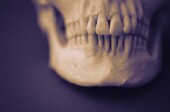
FRIDAY, Nov. 19 (HealthDay News) — Children today take longer to mature than Neanderthal children did, which may have given modern humans an evolutionary advantage, researchers suggest.
In the study, a multinational team of scientists used synchrotron X-ray imaging to study the fossil teeth of young Neanderthals and Homo sapiens.
“Teeth are remarkable time recorders, capturing each day of growth much like rings in trees reveal yearly progress. Even more impressive is the fact that our first molars contain a tiny ‘birth certificate’ and finding this birth line allows us to calculate exactly how old a juvenile was when it died,” Tanya Smith, a researcher at Harvard University and the Max-Planck Institute for Evolutionary Anthropology, said in a news release from the European Synchrotron Radiation Facility.
The fossil teeth were analyzed at the facility, located in France. The scientists found that Neanderthal teeth grew much faster than the teeth of modern humans.
The longer maturation process in modern human children may lead to additional learning and complex cognition, giving humans a competitive advantage over Neanderthals, the study authors noted.
The shift from a primitive “live fast and die young” strategy to a “live slow and grow old” strategy has helped make modern humans one of the most successful organisms on the planet, according to the scientists.
The study was published in this week’s online issue of the Proceedings of the National Academy of Sciences.
More information
The American Museum of Natural History has more about human evolution.

